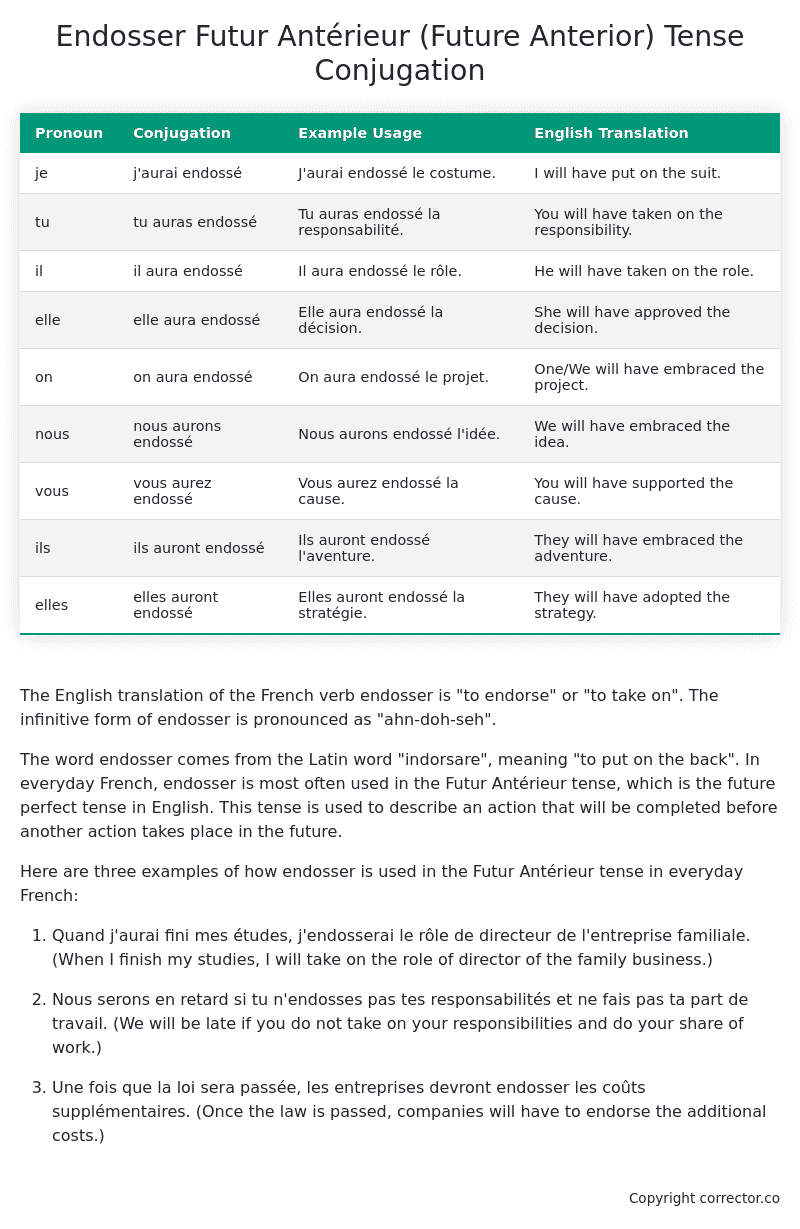Futur Antérieur (Future Anterior) Tense Conjugation of the French Verb endosser
Introduction to the verb endosser
The English translation of the French verb endosser is “to endorse” or “to take on”. The infinitive form of endosser is pronounced as “ahn-doh-seh”.
The word endosser comes from the Latin word “indorsare”, meaning “to put on the back”. In everyday French, endosser is most often used in the Futur Antérieur tense, which is the future perfect tense in English. This tense is used to describe an action that will be completed before another action takes place in the future.
Here are three examples of how endosser is used in the Futur Antérieur tense in everyday French:
-
Quand j’aurai fini mes études, j’endosserai le rôle de directeur de l’entreprise familiale. (When I finish my studies, I will take on the role of director of the family business.)
-
Nous serons en retard si tu n’endosses pas tes responsabilités et ne fais pas ta part de travail. (We will be late if you do not take on your responsibilities and do your share of work.)
-
Une fois que la loi sera passée, les entreprises devront endosser les coûts supplémentaires. (Once the law is passed, companies will have to endorse the additional costs.)
Table of the Futur Antérieur (Future Anterior) Tense Conjugation of endosser
| Pronoun | Conjugation | Example Usage | English Translation |
|---|---|---|---|
| je | j’aurai endossé | J’aurai endossé le costume. | I will have put on the suit. |
| tu | tu auras endossé | Tu auras endossé la responsabilité. | You will have taken on the responsibility. |
| il | il aura endossé | Il aura endossé le rôle. | He will have taken on the role. |
| elle | elle aura endossé | Elle aura endossé la décision. | She will have approved the decision. |
| on | on aura endossé | On aura endossé le projet. | One/We will have embraced the project. |
| nous | nous aurons endossé | Nous aurons endossé l’idée. | We will have embraced the idea. |
| vous | vous aurez endossé | Vous aurez endossé la cause. | You will have supported the cause. |
| ils | ils auront endossé | Ils auront endossé l’aventure. | They will have embraced the adventure. |
| elles | elles auront endossé | Elles auront endossé la stratégie. | They will have adopted the strategy. |
Other Conjugations for Endosser.
Le Present (Present Tense) Conjugation of the French Verb endosser
Imparfait (Imperfect) Tense Conjugation of the French Verb endosser
Passé Simple (Simple Past) Tense Conjugation of the French Verb endosser
Passé Composé (Present Perfect) Tense Conjugation of the French Verb endosser
Futur Simple (Simple Future) Tense Conjugation of the French Verb endosser
Futur Proche (Near Future) Tense Conjugation of the French Verb endosser
Plus-que-parfait (Pluperfect) Tense Conjugation of the French Verb endosser
Passé Antérieur (Past Anterior) Tense Conjugation of the French Verb endosser
Futur Antérieur (Future Anterior) Tense Conjugation of the French Verb endosser (this article)
Subjonctif Présent (Subjunctive Present) Tense Conjugation of the French Verb endosser
Subjonctif Passé (Subjunctive Past) Tense Conjugation of the French Verb endosser
Subjonctif Imparfait (Subjunctive Imperfect) Tense Conjugation of the French Verb endosser
Subjonctif Plus-que-parfait (Subjunctive Pluperfect) Tense Conjugation of the French Verb endosser
Conditionnel Présent (Conditional Present) Tense Conjugation of the French Verb endosser
Conditionnel Passé (Conditional Past) Tense Conjugation of the French Verb endosser
L’impératif Présent (Imperative Present) Tense Conjugation of the French Verb endosser
L’infinitif Présent (Infinitive Present) Tense Conjugation of the French Verb endosser
Struggling with French verbs or the language in general? Why not use our free French Grammar Checker – no registration required!
Get a FREE Download Study Sheet of this Conjugation 🔥
Simply right click the image below, click “save image” and get your free reference for the endosser Futur Antérieur tense conjugation!

Endosser – About the French Futur Antérieur (Future Anterior) Tense
Construction
Common Everyday Usage Patterns
Interactions with Other Tenses
For example
Summary
I hope you enjoyed this article on the verb endosser. Still in a learning mood? Check out another TOTALLY random French verb conjugation!


